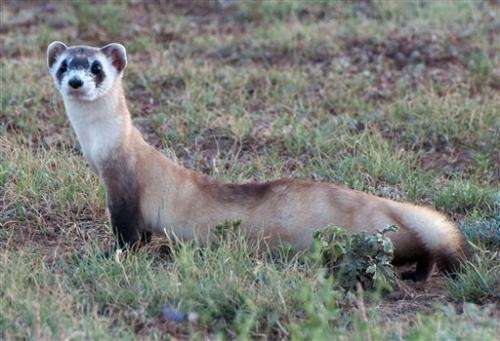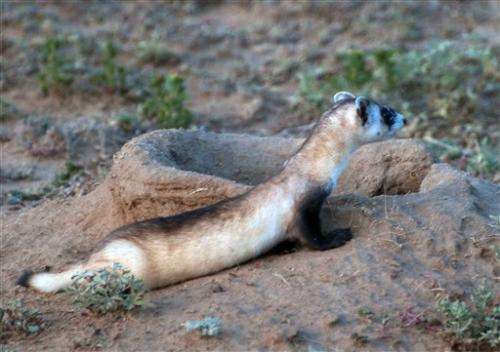This undated image provided by the U.S. Fish and Wildlife Service shows a black-footed ferret at the Vermejo Park Ranch in northern New Mexico. The agency is working with landowners such as media mogul Ted Turner, who owns the ranch, to recover the endangered species across 12 western states. (AP Photo/ U.S. Fish and Wildlife Service, Kimberly Fraser)
A more than half-million-acre ranch that straddles the New Mexico-Colorado border and is owned by media mogul Ted Turner has asked for permission to import endangered black-footed ferrets.
The carnivores have struggled across the Great Plains, and the Vermejo Park Ranch wants to bolster their numbers as part of a recovery program spanning 12 Western states.
It will be up to the New Mexico Game Commission to clear the way for a permit for the ranch. The panel is scheduled to consider the matter Thursday.
Biologists at the ranch have been working for years to recover the species, but this marks the first time they have to jump through an extra hoop of review because of a regulatory change involving the importation and release of carnivores on private land in New Mexico.
State wildlife officials say the change is aimed at bringing more transparency to the approval of such proposals and doing so in a way that allows for public comment. Previously, only approval from the director of the New Mexico Game and Fish Department was needed.
Critics, including the Sierra Club and other environmental groups, contend the change was an attempt to stall the recovery of other more controversial endangered species, namely the Mexican gray wolf, and that the ferret was caught in the crossfire.
Mike Phillips, executive director of the Turner Endangered Species Fund, said he understands the need for transparency and is prepared to provide the state whatever information it needs about work being done at the ranch.
This undated image provided by the U.S. Fish and Wildlife Service shows a black-footed ferret at the agency's National Black-footed Ferret Conservation Center in Wellington, Colo. The agency is working with landowners such as media mogul Ted Turner to recover the endangered species across 12 western states. (AP Photo/ U.S. Fish and Wildlife Service, Kimberly Fraser)
"With their new regulations, it's important that we meet with the commission and make sure they're aware of where the program is and what we're intending to do," Phillips said.
Black-footed ferrets were once found across a range that stretched from New Mexico and Texas to the Canadian border. Widespread poisoning of prairie dogs—the majority of a ferret's diet—and the conversion of land for grazing wiped out most of the animals.
Today, unstable prairie dog populations and a new wave of plague have complicated recovery efforts. Their short lifespans also don't help.
"If you were going to design an endangered species you may well design a black-footed ferret," Phillips said. "They have not been dealt a good hand."
Pete Gober, the federal government's ferret recovery coordinator, said the U.S. Fish and Wildlife Service is working with private landowners like Turner and smaller ranching operations to implement a 10-year plan for boosting ferret numbers across the region. That plan calls for adding several more reintroduction sites to the current 21.
But the work goes beyond simply releasing ferrets into wide open spaces.
This undated image provided by the U.S. Fish and Wildlife Service shows a black-footed ferret outside a den at the Vermejo Park Ranch in northern New Mexico. The agency is working with landowners such as media mogul Ted Turner, who owns the ranch, to recover the endangered species across 12 Western states. (AP Photo/ U.S. Fish and Wildlife Service, Kimberly Fraser)
"It's not that you're going to rewind the clock and walk away and it's going to tick forever. It's going to take continued management," Gober said.
At Vermejo Park Ranch, biologists started out with a captive breeding program that helped supply ferrets to the Fish and Wildlife Service for transplantation. That morphed into efforts by the ranch to establish its own population.
Ferrets are notoriously difficult to survey, but the ranch estimates there might be a handful scattered across its high-elevation meadows. There's evidence they are surviving the winters and reproducing, indicating the ranch is moving in the right direction.
If Vermejo Park Ranch gets its permit, Phillips said more ferrets could be released as soon as this summer, adding to roughly 300 that are believed to be in the wild.
"The right track for ferrets is a prolonged willingness to try," he said. "Some of these issues we're looking at—whether it's Rio Grande cutthroat trout, desert bighorn sheep or black-footed ferrets—the fix to the problem is not one that's immediately achieved."
© 2015 The Associated Press. All rights reserved.























